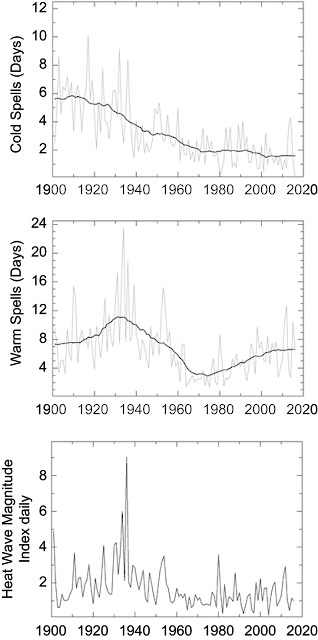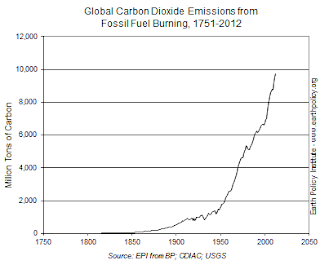The best estimate of the extent of global warming since 1750 is around 1ºC (e.g. see this recent paper published by the American Meterological Society). However, global temperatures changed continuously before this period as the following graph of the Northern Hemisphere proxy temperature for the past 2,000 years data shows.
 |
| Paleoclimatic temperature data for the last 2,000 years Source: https://www.ncdc.noaa.gov/global-warming/last-2000-years |
You can see that temperatures have increased markedly since around 1500 but a significant amount of that warming happened before 1900. If we look at mankind's CO2 emissions, they didn't start increasing significantly until the beginning of the 20th Century and didn't really take off until the 1950s.
The CO2 emissions curve traces a similar arc to the temperature line in red in the first graph but the increase in global temperatures started well before the rapid increase in the levels of human CO2. In fact, about half of the rise in temperatures predates the rise in CO2 from fossil fuels. So, how much of the global warming is manmade?
The United Nations Intergovernmental Panel on Climate Change (IPCC), in its 2013 fifth assessment report, states that it is “extremely likely that more than half of the observed increase in global average surface temperature” from 1951 to 2010 was caused by human activity. In other words, up to half of the increase was not due to human activity. This is the consensus of scientists - that mankind's carbon emissions are contributing to, but not wholly responsible for, an increase in global temperatures. It is also the consensus of most people on the so-called 'denier' side of the argument.
So what to do about it? And should we do anything at all? Well, it depends on how much of a problem it is going to be. Looking at the first graph again, you can see that we are getting back to about the temperatures that prevailed around 1000AD - the Medieval Warm Period. There is no evidence, notwithstanding all the alarmist news reports about storms and heatwaves, that we have suffered any ill effects from the warming to date at all. We have had no increase in severe storms or heatwaves since 1950. For example, despite all the claims about the extreme weather in the United States recently, the following graphs from the National Oceanic and Atmospheric Administration (NOAA)'s Fourth National Climate Assessment show the frequency of cold spells, heat waves and the intensity of heat waves for the continental United States have mostly decreased since 1900.
 |
| Frequency of cold spells and heat waves and magnitude of heat waves in continental USA since 1900 |
 |
Global Death and Death Rates Due to Extreme Weather Events, 1900–2008
|
Of course, all that doesn't mean there are no serious effects of pumping billions of tons of carbon dioxide into the atmosphere year after year, but it also doesn't mean we have to abandon global capitalism because we face imminent doom, as so many climate change activists advocate. Indeed, to do so would be great folly because it is capitalism that provides the technological innovation we need to move to less dependence on the fossil fuels that enable us to live longer and better lives than ever before.
The challenges are of physics and economics. We use petroleum because it is the most efficient and accessible store of energy we have discovered. Companies like Tesla are pushing the curve in terms of battery life, charge time and weight, but we still have a long way to go before we can refill our car in a minute and drive 1,000 kilometres without stopping. Once the technology is cheap and ubiquitous, we won't need government regulations and carbon taxes to get us into electric cars.
The United States leads the world in reducing carbon dioxide emissions from fossil fuels. It has done so by moving to fracked natural gas for power generation and in agricultural and industrial production. Natural gas produces less than half the carbon dioxide of coal and two-thirds that of diesel oil. The development of fracking has been a wholly private-sector-led change that was done in spite the efforts of the Obama administration and many state governments to thwart it. Trump has sensibly reversed these policies and fracking has continued to grow to the point where America is now the largest producer of oil and gas in the world.
New Zealand's coalition government is determined to turn this country into a 'zero carbon' nation by 2050. The effects of this, as I have previously posted, will be to reduce our GDP by up to 22%. New Zealand produces around 0.1% of global CO2 emissions, so nothing we will do will have any direct impact on global warming. It is purely virtue signalling and unfortunately it will have huge impact on the quality of life in this country, all to fix a problem that the evidence shows to be not particularly serious.

No comments:
Post a Comment